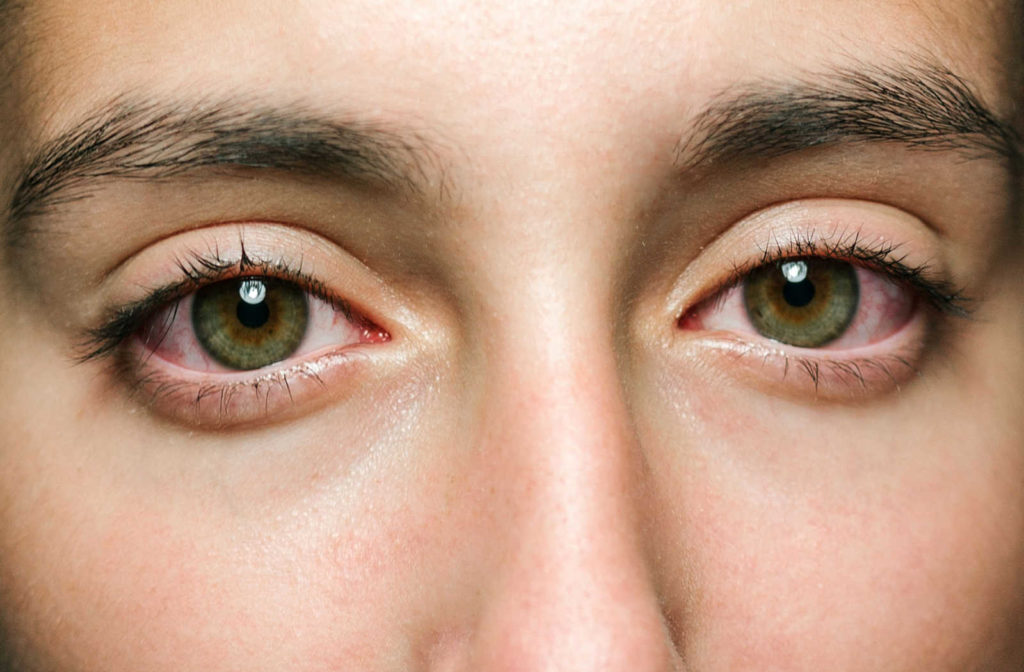Preserving your eye health is a priority, and your eye care journey begins with consistent eye exams with your optometrist. An eye exam can do more than just update your prescription—it can help detect and treat other visual issues.
Conjunctivitis can be one of these eye conditions that cause discomfort and concern.
Let’s look at what conjunctivitis is, some signs and symptoms, and if it goes away by itself.
What Is Conjunctivitis?
Conjunctivitis, also known as pink eye, occurs when there is an inflammation or infection of the transparent membrane that lines the eyelid and covers the white of the eyes.
Conjunctivitis can be a result of a bacterial or viral infection as well as allergic reactions. In some cases, conjunctivitis can be contagious and cause eye pain and severe redness.
Some common signs and symptoms of pink eye can include:
- Eye redness
- Itchy eyes
- A gritty feeling in your eyes
- Tearing in the affected eye
- A pus-like discharge
Even though conjunctivitis can be irritating and difficult to look at, it rarely affects your vision, and treatment can help ease the discomfort that comes along with it.
There are 3 different categories of conjunctivitis:
Infectious Conjunctivitis
Bacterial conjunctivitis can occur from direct contact with bacteria and is contagious and quickly spread.
Viral conjunctivitis is usually caused by viruses associated with a cold and is highly contagious. This type of infectious conjunctivitis will quickly spread to both eyes.
Both viral and bacterial conjunctivitis can result from colds or symptoms of a respiratory infection, such as a sore throat. Both are extremely contagious and spread through direct or indirect contact with the liquid from the eye of someone infected.
Allergic Conjunctivitis
This type of conjunctivitis is caused by direct contact with eye irritants. It can be seasonal (pollen, ragweed, grass) or occur year-round due to dust, fabrics, or other items. Allergic conjunctivitis is not contagious.
Chemical Conjunctivitis
This type of conjunctivitis is caused by exposure to irritants such as air pollution, chlorine in a swimming pool, or noxious chemicals. Chemical conjunctivitis is not contagious.
However, if the initial flushing of the chemicals does not resolve symptoms, it’s essential to contact your optometrist for urgent eye care.
Managing Conjunctivitis
You may be wondering if conjunctivitis goes away on its own, as this condition has been known to appear for various reasons.
Depending on your conjunctivitis type, your optometrist may recommend eye drops or antibiotics as treatment. If you wear contact lenses, you should also stop wearing them. If symptoms do not improve after 12 to 24 hours, you should make an appointment to see your optometrist.
Most forms of conjunctivitis usually go away on their own within 1 to 2 weeks. Still, it’s essential to prevent spreading it if your conjunctivitis is contagious.
Treating conjunctivitis also involves soothing your eyes and ensuring your hands are clean, and your eyes are protected throughout the day to avoid worsening the effects.
It’s important to know that there are different eye conditions that can cause eye redness, and these conditions may result in:
- Severe eye pain
- Blurred vision
- Light sensitivity
- A foreign body sensation in your eye
These symptoms can indicate the need for emergency eye care, and you should contact your optometrist as soon as possible. Your optometrist will thoroughly check your eyes to ensure you don’t have a more severe eye infection that can cause more issues.
A Cautious Approach to Conjunctivitis
Conjunctivitis is a common condition, and management can vary depending on severity. It’s always good to be cautious about anything affecting your eyes and vision. Taking the necessary steps to treat conjunctivitis is essential to accelerate recovery and alleviate discomfort.
Book an appointment with your optometrist today to learn more about conjunctivitis and see what treatment works for you.




